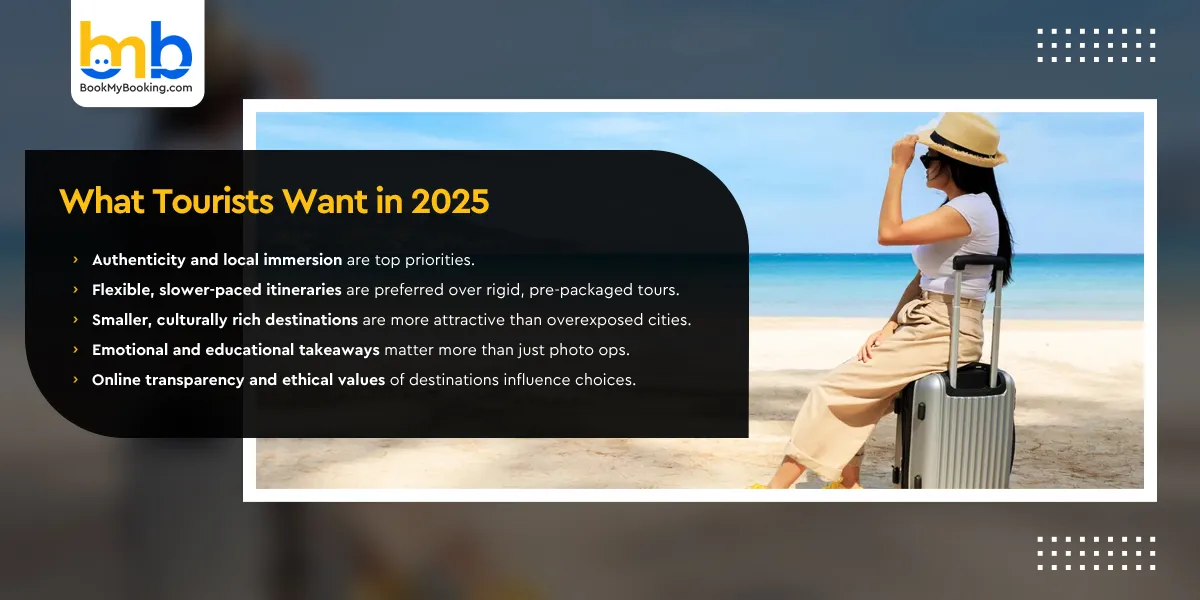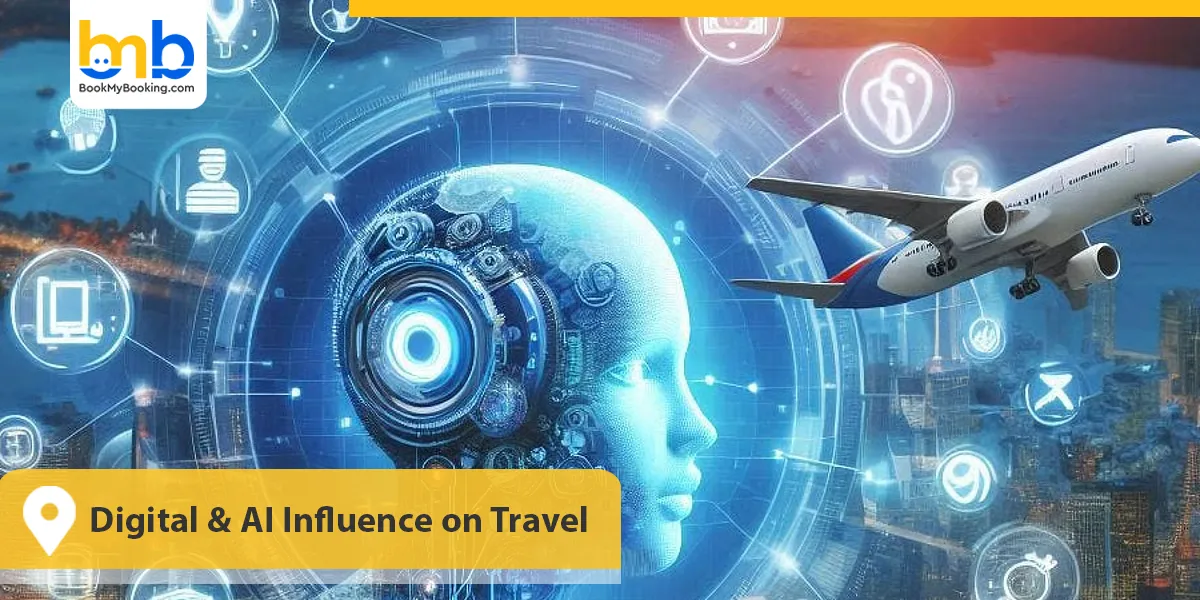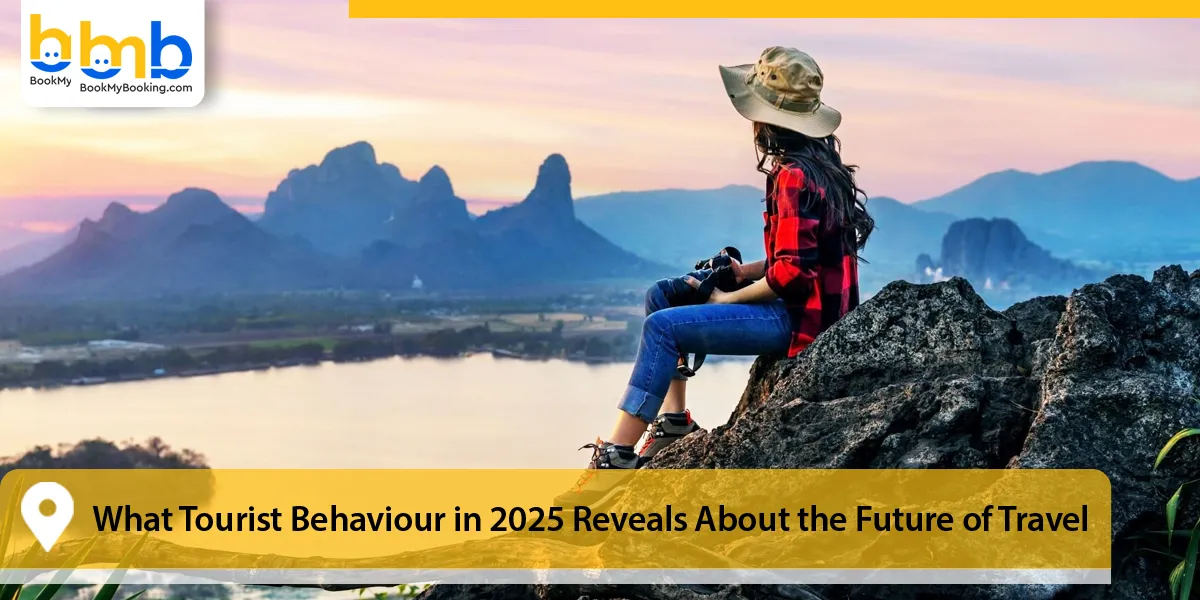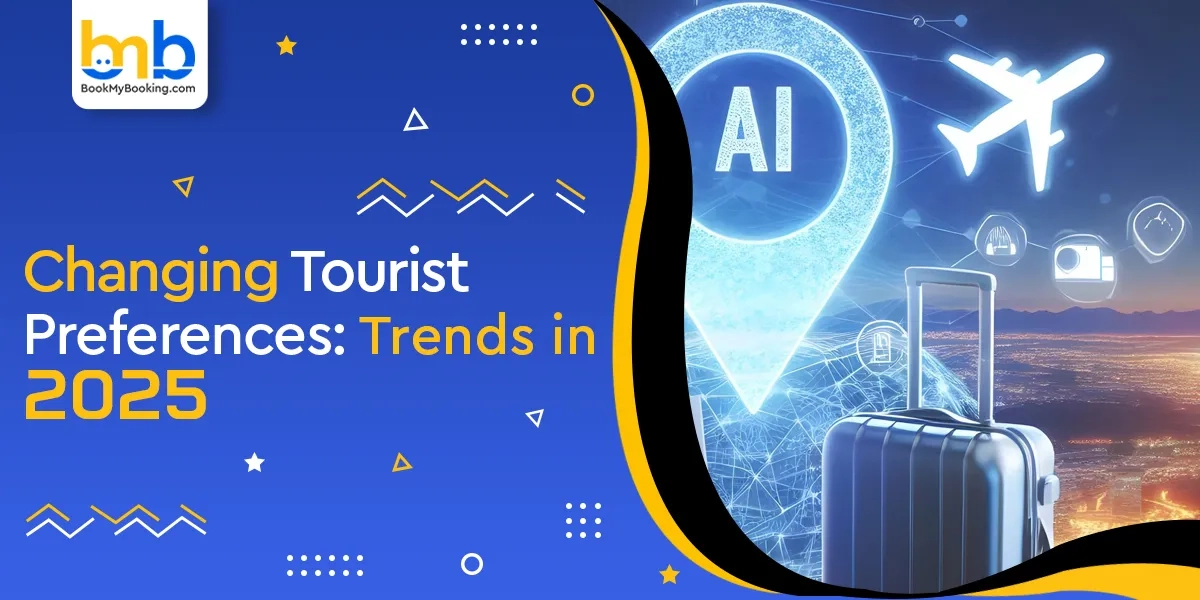In 2025, the global travel industry looks nothing like it did just a few years ago. Tourists are no longer passive participants chasing popular landmarks. They've become more informed, intentional, and experience-driven. The changing preferences of tourists are fueled by technology, environmental awareness, and a desire for a deeper cultural connection. This is transforming how people explore the world. Today's travellers expect more than convenience; they seek purpose, personalisation, and responsibility.
This blog explores the key travel industry consumer behaviour trends defining the year, from digital planning tools and AI-powered itineraries to sustainable travel choices and unconventional destination preferences.
Modern traveller expectations in 2025
In 2025, travel is connecting, understanding, and feeling a place. Tourists today are more selective, intentional, and aware. The days of passive travel, rushing from attraction to attraction with a camera in hand, are replaced by more thoughtful and immersive experiences. This change in attitude is shaping modern traveller expectations and shifting how the tourism industry responds.
From Sightseeing to Storytelling
The changing tourist preferences show that people want stories to bring back home, not souvenirs. A 2024 Amadeus report found that 71% of global travellers prioritise experiences that "teach them something new" over conventional vacations. This directly results from tourist decision-making trends leaning toward meaningful, emotionally resonant travel. Whether learning to make pasta with a grandmother in Bologna or herding reindeer with the Sámi people in Norway, the desire is clear: travel should transform.
Authenticity Over Aesthetics
In 2025, tourists will no longer be impressed by glossy brochures or iconic Instagram backdrops alone. What they truly want is authenticity. Instead of just visiting Times Square, today's travellers would rather explore Harlem's jazz scene or attend a soul food cooking workshop. This is especially common among Gen Z and Millennials, who comprise nearly 70% of global travel spenders (Skift, 2024). They want to be part of the local culture, not just observers.
Crowd Avoidance & Destination Diversity
One of the strongest emerging travel trends is avoiding crowded tourist traps. According to CNBC Travel, more than 64% of travellers in 2025 say they intentionally seek less popular but equally enriching destinations. This "anti-mainstream" travel mindset transforms lesser-known cities, such as Ljubljana, Slovenia, or Gjirokastër, Albania, into next-generation travel hotspots. This trend reflects a growing sensitivity to over-tourism, a problem that, pre-COVID, led to a local backlash in places like Venice and Barcelona. In 2025, tourists ask not just, "What's beautiful?" but "What's ethical to visit?"
Slow Travel and Deeper Connections
Another key trend in consumer behaviour in the travel industry is "slow travel." Instead of cramming four countries into 10 days, people are now spending a week or two in one region and deeply immersing themselves in that country's culture. The Global Travel Trends Report (2025) shows that 53% of international travellers prefer extended stays in a single location to "build real connections" with a place.
- This shift has significant implications:
- Local economies benefit more when tourists linger and spend on community-based activities.
- Environmental impact is reduced when tourists fly less and explore more locally.
- Emotional attachment to a destination deepens, increasing the likelihood of return visits.
Technology Enables Personalisation
Modern travellers are more empowered than ever, thanks to technology. From AI-based itinerary planners to user-generated Google reviews, they research deeply before making decisions. According to BookMyBooking.com, 80% of modern travellers use three or more online platforms before choosing a destination. They aren't swayed by ads but by honest reviews, influencer experiences, and real-time social media feedback. This democratisation of information has raised modern traveller expectations; travellers now expect hyper-personalised journeys that match their interests, values, and pace.

Sustainable Tourism & Traveller Mindset
In 2025, the travel industry isn't just responding to demand, but values are reshaping it. Sustainable tourism and traveller mindset have become central to both tourist decision-making trends and travel planning strategies. Travellers today aren't only asking "Where should I go?" but also "How can I travel responsibly?" and "What impact will I have?"
Why Green is the New Gold
More than 78% of global travellers say they want to make more environmentally conscious choices in 2025, according to a recent Booking.com Sustainability Report. This dramatic rise demonstrates that eco-conscious tourist behaviour is no longer niche; it has become mainstream.
So, the question is, how do travellers choose their destination today? Travellers now look beyond the glossy pictures and delve into ethical concerns such as:
- Carbon emissions from flights
- The treatment of animals in tourism
- Waste management in destinations
- Overtourism and community displacement
These concerns shape what travellers book, where they go, and how long they stay, directly influencing travel industry consumer behaviour.
Green Travel Trends 2025: What's New?
The green travel trends in 2025 indicate not just intent but action. Travellers are:
- Offsetting flights using apps like MyClimate or through airline carbon calculators
- Opting for eco-certified accommodations (EarthCheck, Green Key, and others)
- Choosing trains and buses over short-haul flights in Europe and Asia
- Carrying reusable bottles, cutlery, and shopping bags
- Booking community-based tourism experiences—like agro-tourism in Tuscany or village stays in Bhutan
This shift highlights how changing tourist preferences now align with sustainability. People are no longer satisfied with enjoying nature, and they want to protect it.
Responsible Tourism is a Good Business
From a business perspective, sustainability is a selling point. According to Amadeus, 73% of travellers globally are more likely to book with providers who identify sustainable practices. This means:
- Hotels showcasing water-saving measures get more bookings
- Tour companies that limit group sizes or support local guides are preferred
- Destinations that manage tourist numbers (like Bhutan's daily visitor fee) are applauded rather than avoided
The growth of responsible tourism is not just moral, it's also profitable. The most resilient destinations in the post-pandemic era have been those with well-managed, responsible tourism models.
Read More: Unwraps The Best Destinations For 2025
Ethics, Not Just Environment
The rise of sustainable and ethical tourism in 2025 is about people. Travellers are becoming more aware of:
- Fair wages for hospitality and tour staff
- Respecting Indigenous cultures and sacred spaces
- Saying no to exploitative practices like elephant rides or fake orphanage visits
In response, we see a spike in travellers choosing tours that benefit women artisans, indigenous cooperatives, and wildlife conservation programs. These are not fringe travellers; they are part of a larger movement that believes that travellers' choices of destinations today must reflect their values.
The Social Media Mirror
The role of digital platforms can't be ignored in this movement. Tourists now publicly call out greenwashing and celebrate authentic eco-efforts. Platforms like TikTok and Instagram help share beautiful sights and eco-friendly tourist behaviour tips—from "leave no trace" hiking guides to zero-waste packing routines.
This digital shift encourages accountability. The more travellers show their conscious choices, the more others are inspired to follow. Social proof is now a powerful tool for sustainability.
Governments & Industry Step Up
Destinations and service providers are catching up. More than 40 countries have implemented tourism sustainability policies in alignment with the United Nations' Sustainable Development Goals (SDGs). Cities like Amsterdam regulate Airbnb and limit cruise ships, while Costa Rica incentivises eco-lodges with tax benefits.
Such government efforts support and reinforce the travel industry's consumer behaviour, which is gravitating toward sustainability. The alignment between government, industry, and tourist mindset is stronger than ever in 2025.
Digital & AI Influence on Travel

The travel experience in 2025 is no longer confined to airports, hotels, and sightseeing. From dreaming to booking, exploring, and sharing, every stage is shaped by digital innovation. Technology is now embedded in the travel industry's consumer behaviour, which plays a central role in how people interact with destinations and make decisions.
Smart Travel is Mainstream
Gone are the days when travellers relied on guidebooks and physical maps. Today, travellers use AI-based apps for everything from planning to language translation. According to the Amadeus Travel Trends Report, over 83% of global travellers in 2025 use at least one AI-driven tool to plan or manage their trip.
These tools include:
- Personalised itinerary generators like Kayak AI or Hopper
- Dynamic pricing alerts based on traveller behaviour
- AI travel concierges integrated into booking platforms or smartwatches
- Virtual language assistants for real-time communication abroad
All this signals a growing dependence on digital support, marking a significant shift in modern traveller expectations.
Social Media: The New Travel Agent
Social platforms are powerful engines in how travellers choose destinations today. Over 70% of Gen Z and Millennials say that Instagram and TikTok heavily influence their travel decisions. A short video of a hidden waterfall in Thailand or a reel showing digital nomads in Georgia can instantly put that destination on someone's radar.
Social media doesn't just inspire—it educates. Hashtags like #ResponsibleTravel or #HiddenGems2025 promote niche experiences that cater to changing tourist preferences, steering travellers away from overcrowded hubs and toward unique, meaningful destinations.
What does this mean for destinations? Official tourism boards no longer determine their visibility and appeal by how well they trend online.
Read More: Guide To Summer Travel With Kids
Virtual Reality & Augmented Previews
Want to know how your hotel room looks before you book? Or what does the view from a Himalayan trek feel like before committing to it? Welcome to virtual reality tourism trends.
In 2025, over 60% of luxury travellers will use VR previews to experience hotels, rooms, trails, and even entire cities before making a booking. This adds a new layer of confidence and excitement to the trip-planning process.
Museums, too, are going digital, offering Augmented Reality (AR) tours where art comes to life or archaeological ruins appear as they were centuries ago. These immersive technologies enhance accessibility and bring destinations closer to travellers even before they arrive.
AI Enhancing On-the-Go Experiences
AI is also improving real-time travel. Innovative city technologies, contactless transit cards, facial recognition check-ins at airports, and AI-based translation tools are helping tourists navigate unfamiliar places with ease.
Some examples include:
- AI luggage tracking via apps like SITA BagJourney
- Voice-activated travel assistants like Google Travel or Apple Vision Pro features
- Contactless hotel check-ins and robotic room service
This wave of contactless and smart travel experiences is no longer a luxury but a basic expectation.
Generation Digital: How Gen Z and Millennials Travel in 2025
Younger generations primarily drive this digital revolution. Gen Z and Millennials:
- Prefer seamless booking through mobile-first platforms
- Expect real-time updates on flights, weather, safety, and local events
- Embrace gamified travel apps that reward eco-behaviour or cultural exploration
- Seek out platforms that combine community reviews with real-world social values
These behaviours reflect a shift from passive consumption to interactive engagement, raising the bar for how destinations and providers communicate.
The Flip Side: Digital Detoxes
Interestingly, while digital tools dominate, many travellers also crave a break from them. A rising long-tail trend among travellers is the desire for a digital detox on vacation. Wellness resorts, retreat centres, and even remote Airbnb stays now advertise "no Wi-Fi" as a perk. This paradox, embracing technology while longing to escape it, adds complexity to tourist decision-making trends. It's not about abandoning tech but choosing when and how to use it meaningfully.
Destination & Experience Preferences

In 2025, travel isn't just about where you go, it's about why you go and what you do there. The modern tourist seeks destinations that align with personal values, cultural curiosity, and lifestyle preferences. As a result, we're witnessing a clear transformation in both tourist decision-making trends and changing tourist preferences. From hidden gems to immersive retreats, the "experience economy" is stronger than ever.
The Rise of Emerging Tourist Destinations in 2025
Big cities like Paris, London, and Bangkok will always draw visitors. But in 2025, more travellers are venturing into lesser-known and less crowded destinations. A CNBC Travel survey found that 67% of travellers now actively avoid "tourist-saturated" cities and seek alternatives with similar appeal but fewer crowds.
Examples include:
- Matera, Italy, instead of Rome
- Da Lat, Vietnam, instead of Hanoi
- Cuenca, Ecuador instead of Quito
- This preference ties directly into factors influencing tourist choices, such as:
- Avoiding over-tourism
- Seeking authentic local experiences
- Supporting smaller, often underserved economies
As a result, governments and tourism boards in emerging destinations are focusing more on responsible development and community-led tourism programs.
Adventure Tourism Trends 2025
For a growing number of travellers, adrenaline is the currency of choice. Adventure tourism trends in 2025 show a boom in activities like:
- Volcano trekking in Guatemala
- Glacier hiking in Iceland
- Paragliding over the Pamir Mountains in Tajikistan
- Wildlife safaris in Gabon or Uganda
According to Allied Market Research, the global adventure tourism market is projected to reach $1,626 billion by 2026, growing at a 13.3% CAGR. This growth reflects modern traveller expectations—people want more than relaxation; they seek transformation, storytelling, and a touch of thrill.
Even families are opting for "soft adventures" such as biking tours, kayaking, or forest glamping experiences, making adventure travel more inclusive.
Cultural Experiences Over Commercial Attractions
In 2025, tourists are opting for local markets over malls and swapping guided audio tours for walking tours with locals. Why tourists prefer cultural experiences is clear: they want stories, not just selfies.
- Experiences in demand include:
- Pottery making in Oaxaca, Mexico
- Visiting Berber villages in Morocco
- Attending Japanese tea ceremonies
- Participating in spiritual rituals in Bali
These are seen not just as activities but as bridges between people. According to Amadeus, 60% of Gen Z travellers say they feel more emotionally fulfilled after taking part in cultural exchanges than after visiting a "famous" landmark.
This interest aligns with sustainable tourism and the traveller mindset, as cultural tourism often supports artisans, small-scale enterprises, and local traditions that might otherwise be overlooked.
The Battle Between Luxury Travel vs Budget Travel Behaviour
There's no longer a one-size-fits-all travel experience. Some tourists are willing to splurge on luxury, while others prioritise affordability, but with a twist. Today's luxury travel means privacy, sustainability, and personalisation. That might be a private jungle villa with a local chef, not a five-star chain hotel.
At the same time, budget travellers are looking for value, not just the cheapest option. They seek:
- Unique hostels with local character
- Farm stays or Couchsurfing experiences
- Free cultural walking tours
- Co-living hubs for extended stays
This shift is reflected in travel behaviour insights for 2025, showing that value-consciousness doesn't mean sacrificing experience. It's about doing more with less and doing it in a meaningful way.
The Rise of Wellness and Retreat Travel
As stress, burnout, and digital fatigue increase, many are turning to travel as a means of resetting. The rise of wellness and retreat travel is undeniable. According to the Global Wellness Institute, wellness tourism is set to grow at a 21% annual rate through 2025.
Travellers are choosing:
- Silent meditation retreats in Sri Lanka
- Digital detox resorts in Costa Rica
- Forest bathing in Japan
- Ayurveda and healing treatments in South India
These journeys are deeply personal, aligning with the factors influencing tourist choices: self-care, spiritual growth, and meaningful reconnection with nature.
What Tourist Behaviour in 2025 Reveals About the Future of Travel

Tourism in 2025 is no longer a simple pursuit of relaxation or sightseeing. It is a complex reflection of evolving values, social consciousness, and personalised decision-making. A blend of digital intelligence, ethical awareness, lifestyle alignment, and emotional fulfilment profoundly influences travellers today. These shifts are not temporary; they are redefining travel industry consumer behaviour for years to come.
Tourist Decision-Making Trends: A Mirror of Global Priorities
One of the most notable changes in tourist preferences is a stronger sense of purpose. Tourists aren't choosing destinations at random, they're analysing how travellers choose destinations today based on a wide range of factors:
- Environmental impact
- Cultural relevance
- Local authenticity
- Social media presence
- Personal mental wellness goals
This growing sense of mindfulness is obvious in Gen Z and Millennial travellers, who now dominate the global tourism landscape. These age groups represent over 60% of all international leisure travel bookings, and they value connection over consumption.
They are reshaping modern traveller expectations from passive sightseeing to meaningful engagement. Whether it's picking a retreat in the Andes or joining a cooking class in Laos, travel has become an opportunity to enrich the soul, not just the social feed.
Digital, Sustainable, and Selective: The Future Is Here
From AI trip planners to zero-waste accommodations, 2025 is the era of seamless, intelligent, and responsible travel. Tourists are more likely to:
- Trust AI over human agents
- Use digital platforms to avoid tourist traps
- Choose destinations with sustainability ratings
- Share experiences to promote under-the-radar locations
All of these behaviours underline the growing influence of digital tools on travel decisions and the rise of eco-conscious tourist behaviour. Today's tourists are not only tech-savvy but also increasingly aware of the social and ecological footprints they leave behind.
They want to travel, yes, but not at the cost of the planet or the culture they're entering.
What Travellers Look For in a Vacation in 2025
Gone are the days when "holiday" meant a beach chair and a cocktail. In 2025, what travellers look for in a vacation falls into four major categories:
- Immersion – learning and connecting with local communities
- Transformation – mental, physical, or spiritual growth through experience
- Ease – digital support and seamless service at every stage
- Ethics – responsible travel choices that align with social or environmental values
Travellers today want to come back changed, not just relaxed. That's why retreat-style getaways, cultural homestays, and adventure-based trips are surging in popularity, reflecting tourists' decision-making trends that are increasingly grounded in purpose.
Final Thoughts: The World Has Changed—So Have We
The tourist of 2025 is thoughtful, informed, and intentional. They're not just tourists; they're explorers, learners, contributors, and sometimes even activists. The rise of sustainable tourism, combined with emerging travel trends such as virtual planning, offbeat destinations, and hybrid working vacations, suggests a future where tourism is both impactful and intimate.
If you're in the travel industry, this means understanding tourists not as buyers of a package but as participants in a story. If you're a traveller, this is your invitation to make your journey meaningful.



